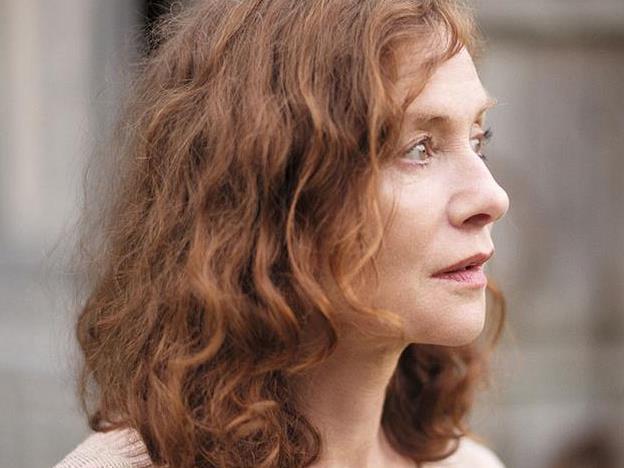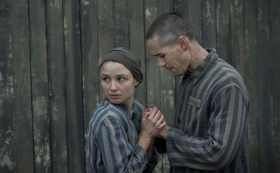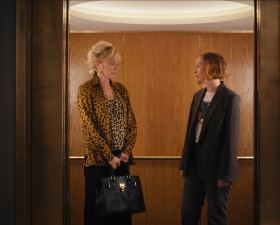When Nathalie Chazeaux (Isabelle Huppert, Louder Than Bombs) stomps around her the beachside home belonging to her ex-husband Heinz (André Marcon, Marguerite), collecting personal items during her last trip there, the hand-held camera bounces along with her every step. When she gazes at her mother’s (Edith Scob, Gemma Bovery) cat with the slightest hint of loneliness and yearning, filmmaker Mia Hansen-Løve (Eden) waits for her look to pass. They’re small touches, deployed expertly by cinematographer Denis Lenoir (Still Alice) and editor Marion Monnier (Personal Shopper) though barely designed to be noticed, but both demonstrate just how attuned the French writer/director’s fifth feature is to the emotional state of its protagonist. Negotiating the ebbs and flows of existence through a character that approaches everything from divorce to death to birth in a matter-of-fact manner that masks her uncertainty isn’t easy; however Things to Come mines seemingly ordinary moments and reactions to do just that.
Though it might appear as though little of significance happens within the frame itself, or weathers Nathalie’s brow over the course of several years, Things to Come is filled with the extremes of life-changing and everyday occurrences. After introducing her point of focus during a family holiday, Hansen-Løve jumps to the middle-aged tumult that would prove much more pronounced and dramatic in other features. Heinz announces he is leaving after 25 years of marriage. Nathalie’s mother’s recurrent panic attacks manifest in more serious ways. Her publisher questions their future endeavours. She spends time at a countryside property with a former favourite student and wannabe anarchist, Fabien (Roman Kolinka, Eden), watching him evolve professionally and personally. Her unwanted feline makes its presence known.
Each of the above instances unfolds organically, in standard — albeit often book-lined — places, and without thrusting many of the expected scenes and histrionics onto the screen. Accordingly, it’s the cumulative effect of space that surrounds such momentous developments that packs as much of a punch, or even more, as the specific circumstances littered throughout the narrative. Things to Come is graceful and underplayed in the way it allows its story to unravel through snippets from Nathalie’s commonplace reality, and thoughtful in its focus on transition rather than its cause. And yet, the movie bursts with feelings that simmer slowly rather than bubble up suddenly, as each slice of life builds upon the last.
In fact, in Hansen-Løve’s most mature effort to date — and most focused on the minutiae of maturity — her plot progresses towards a quiet revelation: while life can become little more than an acceptance that things will indeed come, there’s as much solace as there is sorrow and stress in that realisation. That Nathalie is a philosophy professor allows the film not only to name-drop greats in the field and reference schools of thinking, but weaves a greater contemplative thread throughout its procession of events that everyone will recognise, such as balancing family dynamics, coming to terms with the limited chances for interaction that comes with older age, and facing departures and arrivals in many forms.
Enter Huppert in yet another performance on her resume that appears to be challenging viewers with the impossible task of trying to tear their eyes away from her distinctive presence. Exploring the texture of femininity at a later stage has also been a hallmark of her recent work in Abuse of Weakness and Elle; however here she’s in more restrained but no less resonant territory, both in terms of the narrative she’s traversing and the portrayal she’s offering. As Hansen-Løve observes Nathalie’s relatable ups and downs, Huppert’s fragile fortitude amidst the script’s chronicling of the constancy of inconstancy makes her worth observing whether she’s lecturing a class, sniping about her ex, or looking for her cat. Scob stands out in support, but that the bulk of the cast blend seamlessly, warmly, and welcomely into the fabric of the film is fitting; wandering through Nathalie’s life as much as the collective experience of existence, the feature knows that that’s often the reality.
Rating: 4 stars out of 5
Things to Come
Director: Mia Hansen-Løve
France | Germany, 2016, 102 mins
Melbourne International Film Festival
miff.com.au
28 July – 14 August 2016
Actors:
Director:
Format:
Country:
Release:





